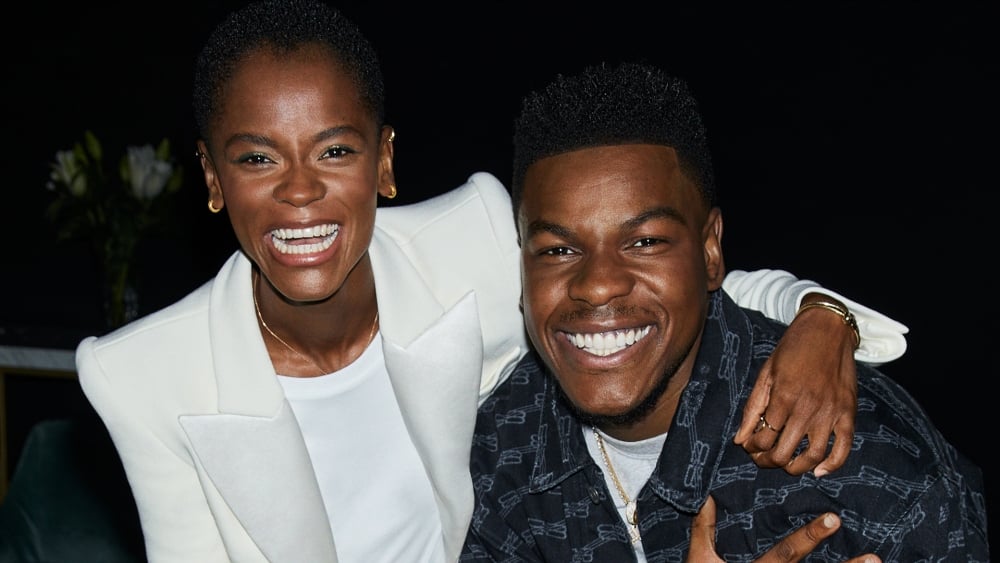John Boyega and Letitia Wright have known each other since meeting 13 years ago at the Identity School of Acting in London; later, they both appeared in Steve McQueen’s “Small Axe” miniseries. Boyega’s 2022 included turns in Abi Damaris Corbin’s Sundance standout “Breaking” and Gina Prince-Bythewood’s “The Woman King.” Meanwhile, in the wake of the tragic loss of franchise lead Chadwick Boseman, Wright took on the mantle of the hero in Ryan Coogler’s smash Marvel movie “Black Panther: Wakanda Forever.”
John Boyega: We’re not going to do this how everybody else does it, because we have history.
Letitia Wright: Yeah, we do. I remember always seeing you in the corridors headed into class and wondering about your process. I remember us as a group always going to McDonald’s and inspiring each other. Someone said to you, “What’s your next TV show?” The first thing you said was “I want to do a big feature film.” You were thinking ahead — into the realms of “Star Wars.”
Boyega: I liked that environment. After class, going to McDonald’s and speaking about what we’re living today. It’s a phenomenal thing. “Wakanda Forever,” your latest project to come out: How do you feel? It’s a big movie, it’s a massive experience.
Wright: Being in the first movie, doing the “Avengers” films, it’s trained me to think about it just in terms of the craft, and not to overthink it. Has it affected people? Did I do the best I could? And did I tell the truth? And then the numbers and the things that’s happening …
Boyega: I know that’s some big numbers. We came from theater. They don’t want to tell you the box office in theater — you’d probably quit. We walked into the movie not knowing what they were going to do after Chadwick’s passing. How did you deal with that through the filming process?

Alexi Lubomirski for Variety
Wright: The first film — because of the love and the appreciation we got from the audiences seeing the ways in which T’Challa was surrounded by women who were just phenomenal — that was the inspiration for this film. And it was an opportunity to express the love that I have for Chad. I’m missing my brother; I want him to be here. But at the same time, I have to honor him with my character and my talent, and I have to do something that can make women around the world proud.
Boyega: Chad — everybody knows the kind of guy he is, especially if you got the grace to meet him. How is it now moving forward?
Wright: It’s a hard pill to swallow. The day it happened, I can remember it like it was yesterday. If I could just go back and just rewind that day and just erase it … Just being on set with my brother, I would give anything in the world just to have that.
Boyega: Do you feel like you look at yourself and you’re a different person?
Wright: There is a process. There is a growth. I feel like we’re growing into who we always were meant to be, and our peer group is so tight. We can access each other very quickly. If you get into a little bit of a pickle, we’ll send that text, “Hey, come back into the fold. Get right.”
Talk to me about “Breaking,” because I watched it on the plane.
Boyega: You watched it on the plane?
Wright: I wanted to watch it on the big screen, but tour life. The way you moved your hands, the way you spoke — it’s like a chameleon really.

Alexi Lubomirski for Variety
Boyega: We had a two-week turnaround from when we confirmed on the role to when we were shooting. It was hitting the ground running. Abi had collected a lot of research; we had to dig deep into who this guy was with this short amount of time. And that indie budget — we ain’t got that “Wakanda Forever.” It felt like theater on film.
Wright: I love that. From that to playing a king in “Woman King.” When you read that script for the first time, how did you feel?
Boyega: This is the closest I’m going to ever get to being in “Black Panther.” So there was that connection. I was like, “I’m closer to Wakanda.” And then it was about Gina Prince-Bythewood, our director, who wrote me this letter, and it felt like a call to action. But also, I knew that I would be wearing robes. I’m Nigerian — I must wear robes that are magnificent and colorful. So there’s a fun element to it.
Wright: For us to see ourselves in that way, from auditioning to being able to step into this arena of Black characters that are at the forefront of some of the most amazing stories in Hollywood …
Boyega: It’s the dream. Whether it’s me and you … and with Daniel Kaluuya, there’s a unity, and a way in which we help each other as actors as well, that I think a lot of people don’t know about.
Boyega: When we had our last conversation, we were on the phone for four hours when I was in New York, and I don’t know whether you had been filming “Wakanda Forever” …
Wright: Yeah, I was.
Boyega: You were filming it. When you do something as massive as “Black Panther” — how do you handle the realization of where you’re at?
Wright: It’s madness. I try not to tap into how big it is, because it’s like walking on a plank to the end, and the second you look down, you’re going to fall. The way I’ve navigated is just by remaining focused on one thing, which is good stories. If I focus on that long enough, then I can build a legacy, and then I can look back at it. I want to enjoy the moments, of course.
You produced “Breaking” also, right? So how do you juggle?
Boyega: You make your sister your assistant. And your sis schedules things based on what she knows of you. We knew what we were aiming for coming up, but we didn’t know how it was actually going to go. You can only hit the ground running.
I used to be on the set of “Star Wars.” In between takes, they’d bring out the convoy of cars that would just come out of nowhere. There was a tent in the distance, and all the producers would go into the tent. And they were discussing what color the lightsaber should be! I was really inspired by it. They’re involved in the conversations that are going to change cinematic history. I want to do that. I have a creative perspective, and I would love to share that with the audience.
Wright: Take me back to “Star Wars.”
Boyega: It was a process. Even getting the role — a good nine-month audition process. Especially with Disney, in terms of them finding the right person: third callback, fourth callback, fifth callback. At the time, I was still staying with Mom and Dad. I’m going back home to the flat, and I’m stressing during this nine months, because I’m like, “Is my life going to change or not?” The role doesn’t only represent a great opportunity as an artist, but it represents a potential change in your life. Man, this is what they were talking about on Season 4 of “Entourage.” This is the real deal. J.J. Abrams being a big confidant was something that changed me for sure, but in good ways — being resilient to certain things, understanding different perspectives. And then, through misfortunes and fortunes, I’m able to advise and give my perspective, and people take from it what they will. But it was long. And you have to stay quiet about it.
Wright: Yeah. All the secrets.
Boyega: Obviously, I watched your film. I’m a Marvel fan, so I’m going to stay for the post-credits. And it’s an important scene that gives us a clue to where the Marvel Cinematic Universe is heading and a big deal for you, in terms of your path as an actress. How does it feel to be part of a monumental moment?
Wright: That post-credit scene for me is another extension of the ways in which we wanted to honor Chadwick — especially the role of T’Challa. In the movie that Chadwick was written into before he passed, there is a journey of a father and son. When reading it, I could sense we had to find a way to continue the legacy of what T’Challa means to the world, especially to young Black men. That scene messed me up.
Boyega: How many kids did you audition?
Wright: Two. Then Divine came in. His name is Divine. He had a little Chadwick Mohawk. Me and Lupita Nyong’o kept looking at each other like, “This is the kid.” That scene is beautiful because it represents what the future will be.
Boyega: For me, low-key, I was thinking: “Letitia’s going to pay the mortgage.” I was like, “She’s still in there. She hasn’t been defeated.”
Set Design by Jack Flanagan
From Variety US
































![[PIAS]/Inertia Music](https://images-r2.thebrag.com/jobs/uploads/2023/01/PIAS-logo-square-300x300.png)

